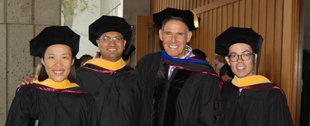Translational Research Training for Doctoral Students
A core mission of The Scripps Research Institute (TSRI) and its Kellogg School of Science and Technology is to educate and train the upcoming generation of biomedical scientists. The Translational Research for Doctoral Students (TL1) program focuses on the support and development of TSRI doctoral candidates seeking careers in translational bio-scientific research. The TL1 program introduces and then integrates doctoral science candidates to the principles of biomedical research through course offerings in applied biostatistics, genomics, molecular medicine, and clinical trial design and via seminar participation with physician-scientists. The doctoral candidate is additionally integrated into the clinical world by working alongside medical clinicians who have a basic/translational science interest and/or practice. In applying for a TL1 position, the doctoral student has developed a research hypothesis and plan wherein he/she collaborates with his/her thesis committee and clinical mentor(s) in seeking a translational solution to an unsolved medical problem. The TL1 Handbook describes program eligibility, application, and requirements.
 TL1 trainee, George Campbell, uses time-lapse microscopy to visualize axonal transport in neurons for his research in Dr. Sandra Encalada’s lab.
TL1 trainee, George Campbell, uses time-lapse microscopy to visualize axonal transport in neurons for his research in Dr. Sandra Encalada’s lab.
The Scripps Translational Science Institute’s (STSI) vision is to accelerate translational and clinical research to impact human health in a meaningful way. The TL1 program provides the appropriate amalgam of integration, innovation, and opportunity to capitalize on the particular strengths of TSRI’s, Scripps Health’s, and partnering institutions’ faculty interests and accomplishments. Building upon and establishing specific collaborations with leading translational science and clinical investigators will accelerate discovery that has impact across multiple research disciplines. Collaborations with a large subset of the 600 life science companies in San Diego provides an extraordinary advantage for accessing innovative technology and catalyzing benefits to patients. STSI exploits the excitement of today’s scientific advances to advance tomorrow’s disease preventions, betterment of health, and the training of the future leaders of academic medicine.
